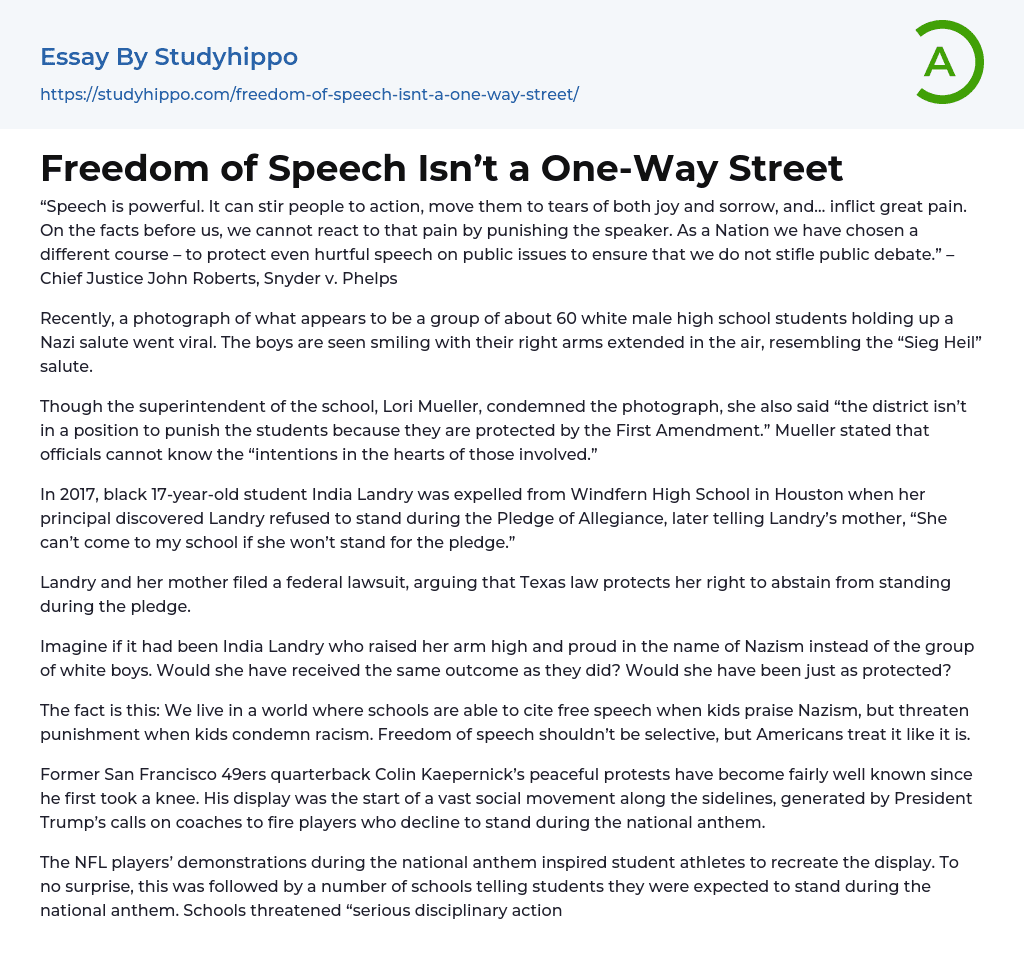The power of speech is immense as it can inspire action, elicit intense emotions like joy and sadness, and even inflict significant harm.
In Snyder v. Phelps, Chief Justice John Roberts stated that although hurtful speech on public issues may be painful, it should not be punished in order to safeguard public debate. However, this perspective was recently challenged when a photograph of about 60 white male high school students surfaced, depicting them making a Nazi salute. While the district superintendent, Lori Mueller, condemned the photo, she acknowledged that the students cannot be punished due to their First Amendment rights. Mueller also highlighted the difficulty in determining their intentions. A similar incident occurred in 2017 when India Landry, a black 17-year-old student at Windfern High School in Houston, was expelled for refusing to stand during the Pledge
...of Allegiance. Landry and her mother filed a federal lawsuit arguing that her right to abstain from standing during the pledge is protected by Texas law.
Consider this scenario: what if India Landry, alongside a group of white boys, defiantly raised her arm in support of Nazism? Would she have faced the same consequences and received the same protection? The fact is that we reside in a society where schools can employ the notion of free speech to defend children who express admiration for Nazism, yet impose punishment when children speak out against racism. It is unfair to selectively apply freedom of speech; however, that is precisely how it is perceived in America. The peaceful protests conducted by Colin Kaepernick, a former quarterback for the San Francisco 49ers, have garnered significant attention since their inception.
President Trump’s urging of coaches
to dismiss players who choose not to stand during the national anthem led to a significant social movement among athletes on the sidelines. The protests by NFL players while the national anthem is played served as an inspiration for student athletes, resulting in them replicating the gesture. Predictably, many schools responded by directing their students to stand during the national anthem. These schools not only issued threats of severe disciplinary measures, such as loss of playing time, participation, and even expulsion from the team but also displayed a lack of comprehension regarding the core principle they are responsible for imparting to their students – the right to engage in peaceful protest.
The demonstrations have a central focus on the issue of race, irrespective of the individuals involved. Their collective objective is to express opposition towards racial injustice and discrimination. Regrettably, those in power who aim to penalize these protesters appear to be disregarding this fundamental aspect. Those who are against the protests frequently make incorrect assumptions that the demonstrators are showing disrespect towards veterans, allowing their emotions to overshadow rationality. This lack of understanding can be attributed once more to our president.
President Trump transformed the NFL demonstrations into a nationwide controversy when he denounced the protests as "a complete disrespect for everything we believe in." He called on NFL owners to dismiss players who kneel during the anthem and encouraged fans to boycott games as punishment for non-compliant owners. Once again, Trump is propagating an erroneous message regarding the principles of the First Amendment. Dissent plays a crucial role in this nation's establishment.
Gene Policinski, from Newseum, explains that public protest has a long history of representing
public sentiment and highlighting marginalized views. This includes protests against taxes during the Colonial era, as well as the prolonged fight against slavery and segregation, women's suffrage, and other important issues. The rights of free speech, press, assembly, and petition have played a crucial role in driving social change and were eventually incorporated into our Constitution.
In 1940, the Supreme Court upheld a law in the Minersville School District v. Gobitis case that required students in public schools to stand and recite the Pledge of Allegiance. Even individuals with religious objections had to follow this ruling. However, just three years later, violent incidents during attempts by authorities to enforce flag salutes led to the overturning of this decision.
Justice Robert H. Jackson emphasizes the significance of safeguarding an individual's freedom of speech, which encompasses their right to refrain from expressing opinions they do not agree with. Thus, it is preferable to endorse a president who appreciates and protects the right to peaceful protest rather than one who promotes terminating individuals and urging others to penalize them. Recently, a photograph captured by 60 white male high school students caused offense; nevertheless, due to the protection provided by the First Amendment, they were immune from any repercussions.
When NFL players kneeled during the national anthem, they angered many individuals, including our less mature president. It is important to recognize that freedom of speech applies to everyone. If one offensive action is protected, there should be no justification for excluding another.
- Euthanasia essays
- Assisted Suicide essays
- Censorship essays
- Gun Control essays
- Empowerment essays
- Civil Rights essays
- Capital Punishment essays
- Death Penalty essays
- Human Trafficking essays
- Sex Trafficking essays
- Gay Marriage essays
- Affirmative Action essays
- Child Labour essays
- Privacy essays
- Speech essays
- Child Protection essays
- Corporal Punishment essays
- Police Brutality essays
- Gun essays
- Death Penalty Pros And Cons essays
- Is The Death Penalty Effective essays
- The victim essays
- Public Speaking essays
- Freedom Of Speech essays
- Free Speech essays
- Persuasive Speech essays
- Gettysburg Address essays
- Informative Speech essays
- Jurisprudence essays
- Social Injustice essays
- Juvenile Justice essays
- Business Law essays
- Contract essays
- Consumer Protection essays
- Property essays
- Ownership essays
- Agreement essays
- Common Law essays
- Contract Law essays
- Justice essays
- Security essays
- Tort Law essays
- United States Constitution essays
- Crime essays
- Lawsuit essays
- Treaty essays
- Family Law essays
- Marijuana Legalization essays
- Constitution essays
- War on Drugs essays




